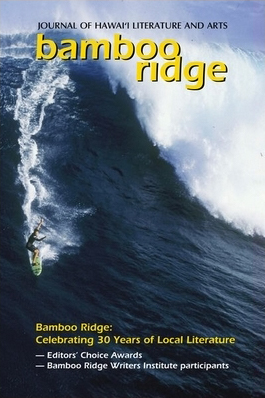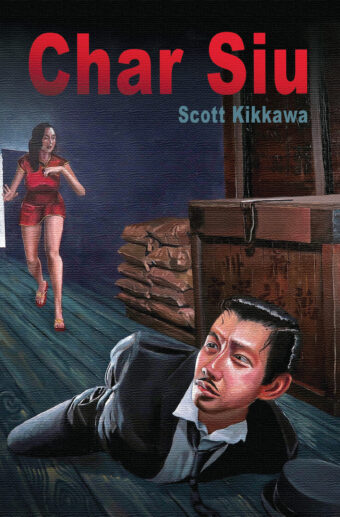You can read or download Guilty in Yap Court as an eBook or PDF, free of charge, via our BR Digital Archives.
Enjoy an excerpt from Issue 91 of Bamboo Ridge Press Journal of Hawaiʻi Literature and Arts, published in Spring of 2007.
Issue 91 gives its readers an anthology of poems and short stories.
GUILTY IN YAP COURT
by Dave Manu Bird
“I knew it. I just knew it would happen,” I muttered to myself as I whacked the steering wheel of the hated Subaru Brat with my fist. How I loathed that pseudo-truck.
I was headed back to the education office at Alaw after a Board of Education meeting when I looked in my rear-view mirror and saw the flashing lights on a blue-and-white police pickup. I pulled over and parked underneath the massive mango trees across the road from the Rai View Hotel, thankful for the shade on that hot, humid day. When I cut the engine, the sound of booming thunder instantly died away.
The police officer approached me. “Sir, do you know that you are illegally operating a defective motor vehicle?”
I couldn’t see how I could deny the fact since even a deaf person could have heard that truck coming from miles away. “Well, ma’am, I guess the muffler sort of got worse all of a sudden,” I allowed.
“I have to ticket you anyway,” the officer said, and she did.
Several weeks later, I left my office and walked down the hill to the courthouse to face judgment. My ticket indicated that I had to be there at 1:00 p.m. I was surprised when I entered the courtroom. It was dark. I turned on the lights and had a seat in the back to await my fate. I waited for some time by myself, getting more puzzled by the minute. No one else appeared—neither clerk nor judge nor fellow miscreants. I finally stood up and wandered into the main office of the state justices.
“Mogethin, Tinan,” I greeted the justices’ secretary, who was also my neighbor in the village. “What’s up?”
“Oiy, mogethin, Qarcheaq,” she said, using my Yapese nickname.
“What happened to court?” I inquired. “I’m here because of my summons.”
“Maang ea summons rom?” Tinan asked, looking perplexed. “I don’t know of any summons for you. Anyway, there’s never court on Wednesday afternoons.”
“But my ticket here says that I’m supposed to appear today at 1:00 p.m.,” I explained as I pulled it out of my basket.
“Mu pii ngog,” she said with hand extended.
I gave her my citation, which she carefully scrutinized. I prepared a betel nut chew while she rummaged through her files, looking for something. “This is strange,” she finally said. “A copy of this ticket was never filed with the court by the arresting officer as the law requires. The date is really funny kine, too. You had better see Tharngan.” With that, she ushered me into the chambers of the chief justice of the Yap State Court.
“Mogethin, Qarcheaq!” Tharngan exclaimed when he saw me. His exuberant greeting gave me momentary pause. Ironically enough, I had once been Tharngan’s supervisor when he was social studies curriculum specialist for the Yap Department of Education, but I doubted that anyone had ever “supervised” him in his life. I admired Tharngan’s intellect and knowledge; at the same time, I knew that he could be arrogantly independent and did not suffer fools lightly. I long suspected that Fanechigiy (my boss) and I were on his fools list. Still, he was gracious and escorted me into his office.
“Moey nga qaraay,” he said with a sweep of his arm. “Mu par nga cheeya.” I did as I was told and sat where he indicated. “Mu feek boech ea langad ngom,” he commanded as he reached into a beat-up Budweiser carton. He proceeded to stuff my basket with handfuls of betel nuts and wads of pepper leaves. Tharngan often had piles of langad to share because he bought extra chews from impoverished elders who lived mostly outside the money economy so that they would have dollars for lamp kerosene and the like.
“Ke rii mu magaer,” I said, thanking him.
We then spent half an hour chewing langad and talking story with two old men who were already in Tharngan’s chambers. Tharngan often consulted with his elders when questions of custom and tradition came before the court. Our conversation turned to a fine point about land stewardship, and it quickly overwhelmed my pathetic and inadequate Yapese language skills. My mind started to wander as it sometimes did in such situations.
I looked around Tharngan’s chambers. The room was a mess. Dozens of legal tomes were scattered in piles on the floor and in disarray on the office shelves. Beer cans with their tops cut off littered his desk. They were overflowing with old reddish-black betel nut quids and cigarette butts. Little quivering clouds of minute fruit flies pulsated over the desiccated chews. Motes emanating from the layer of dust covering everything in the room hovered in a shaft of sunlight that shone through the window. The smell of mold and mildew from the books and the ancient air conditioner wheezing in rusted agony stung my nose….
To read the rest of this story along with other poems and short stories that we published in 2007, head to the repository from the University of Hawaii: CLICK HERE
Bamboo Ridge Press is an independent non-profit, tax-exempt corporation and is supported through book sales, subscriptions, private donations, and grants from Hawaiʻi State Foundation on Culture and the Arts and the National Endowment for the Arts, Hawaiʻi Council for Humanities, and others. Your generous contributions and support are welcome and may be tax-deductible.
Monies raised help Bamboo Ridge Press continue its mission to foster the voices of our people through new publishing projects, educational programming and community outreach such as workshops for adults and youth, and free public readings. It will also help to digitize the Bamboo Ridge Press Archive, which will preserve four decades of local literature and provide free and open access to issues that are no longer in print.











Talk story